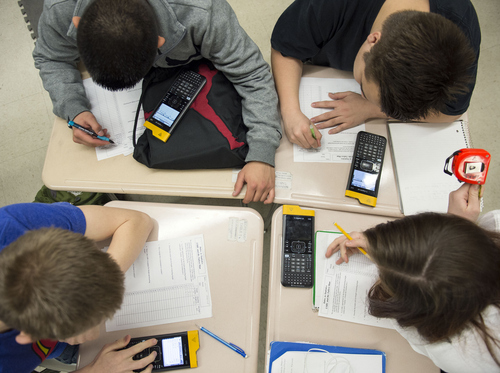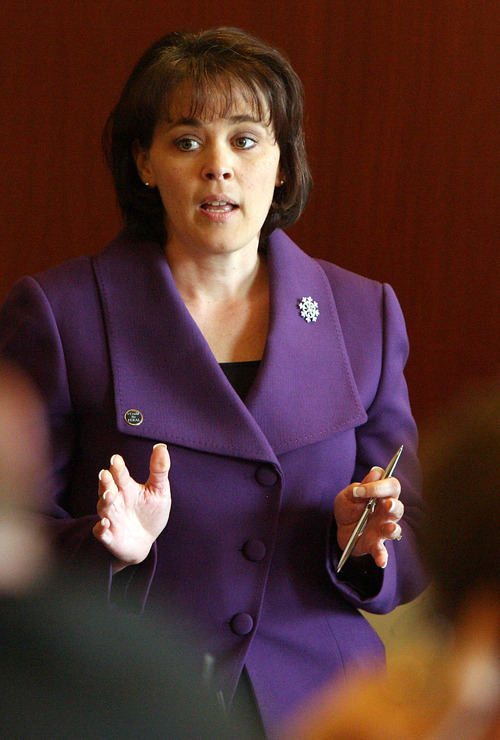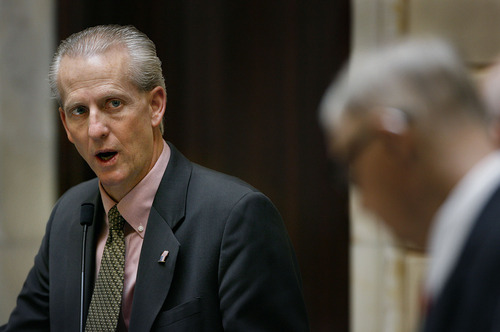This is an archived article that was published on sltrib.com in 2014, and information in the article may be outdated. It is provided only for personal research purposes and may not be reprinted.
Senate Republican leaders say they are willing to spend $26 million on House Speaker Becky Lockhart's education technology initiative — a far cry from the $200 million to $300 million the speaker sought for her legacy project and an enormous sticking point in budget negotiations entering the final week of the session.
Senate budget chairman Lyle Hillyard, R-Logan, said the question of how much to put into Lockhart's education technology plan — and where the money should come from — is the only significant issue holding up a budget resolution.
The proposal from the Senate is to put $26 million toward the program, which Hillyard said could go to the first steps like teacher training and ensuring schools have the wireless network needed to accommodate digital devices.
"That to me would resolve the problem. There's not a tax increase and there's no [raid of] highway funds," Hillyard said.
If Lockhart wants more, Hillyard said, the speaker may have to accept a tax increase. The Senate has approved a property tax hike in SB111 that would increase the funding for the technology initiative to $29 million in the first year and $50 million in subsequent years.
But Lockhart has said she doesn't like the idea of using money from SB111 to fund her technology initiative for four years.
"I find it interesting that the Senate would support a property tax increase when there are other places in the budget to find money to fund education. If public education is our highest priority, then we will be able to find the money in other places," Lockhart said.
But Hillyard said the two sides are deeply entrenched in their positions.
"I don't think I've ever seen a time when the two bodies are so adamantly opposed," said Hillyard, who has been in the Legislature for nearly 30 years. "For example, I'm told the House will do nothing with tax increases … and our senators are very adamant they're not going to take money out of transportation funding when there's such a hole there and no way to put it back in."
Rep. Francis Gibson, R-Mapleton, who is sponsoring the speaker's initiative, said the Senate's position is an attempt to use leverage to get the House to approve a tax increase.
"I think it's the Senate's way. They'd like to raise taxes and they think this is a way to do it," said Gibson. "From Day One the speaker said we can do this without raising taxes."
He said there is still a week until the Legislature adjourns and plenty of time for negotiation.
House Majority Leader Brad Dee, R-Ogden, said there are still plenty of issues to be settled in the budget and "it's probably a little early in our negotiating process with the Senate to start putting numbers to things."
He said some of those issues should be worked out by the end of the week, but the House is "not prepared to talk about any tax increases.
Senate President Wayne Niederhauser said there is not one of the 29 senators that support taking money out of transportation to pay for Lockhart's education proposal.
"As far as using transportation funds for that initiative, there is zero support in the Senate," Niederhauser said.
There is already a shortfall in road funding, Niederhauser said, and if Lockhart wanted to take money out of transportation, the Senate would want some way to replenish the funds — possibly through a gasoline tax proposal that the Senate passed earlier in the session.
"If you take money out, you've got to put it back in. We've already dug ourselves a hole in transportation," Niederhauser said. "Many of us are coming back [next year] and we don't want to have to dig out of a deeper hole on transportation."
The senators' comments came a day after Lockhart told reporters transportation was the ideal source of extra funds for education.
"We've been very good to transportation through the years," she said. "We believe that there is revenue in transportation that we can redirect into public education that will not materially affect the transportation program in any kind of significant way that would cause problems."
On Wednesday, Lockhart said she wasn't worried about the apparent stalemate.
"We're dealing with what always happens and that is the House and Senate have different opinions on where the money should be spent," she said. "We'll come to terms with it. I'm not worried."
The speaker rolled out her education technology initiative early in the session, pitching it as a $300 million effort to put a digital learning device in the hands of every one of Utah's more than 600,000 students.
She has since acknowledged that the program could be funded over a period of few years. Her bill awaiting passage in the House seeks $150 million, although she said that is merely a placeholder while budget negotiations play out.
Senate Republican Whip Stuart Adams, R-Layton, said the Senate generally supports the technology initiative, but "it's how you roll it out. We don't have money to spare. So it has to be done in the most efficient way possible."
However, Senate Democratic Assistant Whip Pat Jones, D-Holladay, said, "If we have that much money available, let's invest in our teachers, and lower class sizes."
— Robert Gehrke contributed to this report







